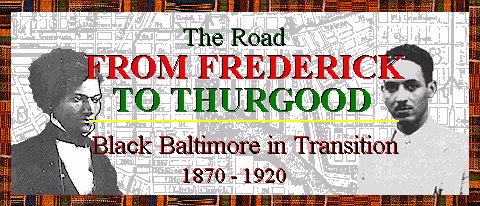 |
Warner T. McGuinn:Professional Career |
 |
Warner T. McGuinn:Professional Career |
Before coming to Baltimore in 1891, McGuinn practiced law in Connecticut and in Kansas City, Kansas. The Maryland bar admitted him in 1892. [1] McGuinn was in a law firm with Harry S. Cummings (1893-5), and later in his career with E. Everett Lane, son of George M. Lane. [2]
After the Republican surge to power in 1895, McGuinn was awarded the position of secretary of the Board of Liquor License Commissioners. [3]
McGuinn collaborated with W. Ashbie Hawkins in the effort to overturn the West segregation ordinance of 1910. [4] McGuinn argued the "celebrated Baltimore segregation case" in 1917. [5]
McGuinn supported woman suffrage and viewed it as corollary to the Negro struggle for full voting rights. In 1911 he read an "exhaustive" paper on this topic to an assembly gathered at Bethel A.M.E. Church to inaugurate the Baltimore Historical and Literary Association. He reminded those present of the principle of the consent of the governed found in the Declaration of Independence and insisted that it followed that all adults irrespective of color or sex thereby had a right to participate in electing representatives. [6]
In 1917 McGuinn was appointed to the Board of Managers of the Colored War Camp Commission Service. In 1920, after his election to the City Council, McGuinn was a delegate to the Republican National Convention in Chicago. [7] He was pushed for the office of Recorder of Deeds for the District of Columbia in 1926 but was not selected. [8]
In his old age, McGuinn looked askance at the younger generation of attorneys. "Some of these fellows are so slick they can take salt out of biscuits without disturbing the covers. . . Once a lawyer's word was sufficient. Today few people will take his word unless he signs his name and puts up a bond. . . Unless entrance examinations are changed so as to include character as well as knowledge, the practice of law will degenerate into a dog fight." [9]
 Return to Warner T. McGuinn Introduction
Return to Warner T. McGuinn Introduction
 Return to Civil Rights & Politics Introduction
Return to Civil Rights & Politics Introduction
 Return to The Road From Frederick To Thurgood Introduction
Return to The Road From Frederick To Thurgood Introduction